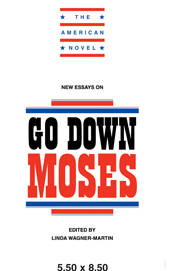Book contents
- Frontmatter
- Contents
- Series Editor's Preface
- 1 Introduction
- 2 Touching Race in Go Down, Moses
- 3 Go Down, Moses and the Discourse of Environmentalism
- 4 Her Shape, His Hand: The Spaces of African American Women in Go Down, Moses
- 5 Who Wears the Mask? Memory, Desire, and Race in Go Down, Moses
- 6 The Game of Courts: Go Down, Moses, Arbitrary Legalities, and Compensatory Boundaries
- Notes on Contributors
- Selected Bibliography
6 - The Game of Courts: Go Down, Moses, Arbitrary Legalities, and Compensatory Boundaries
Published online by Cambridge University Press: 16 January 2010
- Frontmatter
- Contents
- Series Editor's Preface
- 1 Introduction
- 2 Touching Race in Go Down, Moses
- 3 Go Down, Moses and the Discourse of Environmentalism
- 4 Her Shape, His Hand: The Spaces of African American Women in Go Down, Moses
- 5 Who Wears the Mask? Memory, Desire, and Race in Go Down, Moses
- 6 The Game of Courts: Go Down, Moses, Arbitrary Legalities, and Compensatory Boundaries
- Notes on Contributors
- Selected Bibliography
Summary
The control the court sought was the total submission of blacks.
A. Leon Higginbotham, Jr., In the Matter of Color: Race and the American Legal Process: The Colonial Period, p. 9In trying to describe the provisional aspect of slave law, I would choose words that revealed its structure as rooted in a concept of … black antiwill. I would characterize the treatment of blacks by whites in their law as defining blacks as those who had no will. … if “pure will” or total control equals the perfect white person, then, impure will and total lack of control equals the perfect black person.
Patricia J. Williams, The Alchemy of Race and Rights: Diary of a Law Professor, p. 219The Game of Genre
Masculinist sport and games are interconnected with property and law in representing racialized society in Go Down, Moses. In the social state of Faulkner's text, sport and games derive meanings from an effort to duplicate the competition for and control of property within the circumscription of law. Both law and games are forms of social control and discursive bodies of social commentary. Legal boundaries are, however, all arbitrary, but also compensatory for players whose moves are regulated by rules displaced or dislodged from the assumptions of law within the social state. These seemingly disparate modes of thinking about the text contribute to an interpretive strategy for reading Go Down, Moses – one that allows for the multivocality and density of ideas (both compatible and competing ideas) in Faulkner's text.
- Type
- Chapter
- Information
- New Essays on Go Down, Moses , pp. 129 - 154Publisher: Cambridge University PressPrint publication year: 1996
- 9
- Cited by

